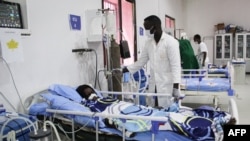Rights group Amnesty International says Somalia’s struggling health care system has been crippled by the coronavirus pandemic. The group released a report Wednesday titled ‘We Just Watched COVID-19 Patients Die.’ It calls for urgent investment in Somalia's healthcare sector after years of neglect.
Amnesty International’s 27-page report on Somalia’s health care says the global pandemic has hit the struggling sector hard.
The Amnesty report quoted a senior Somali doctor saying in one ward on the same day four elderly men died within ten minutes because of lack of oxygen.
The rights group’s Somali researcher Abdullahi Hassan says health resources are so poor that medical workers too often could only stand by and watch their patients die.
“When COVID-19 pandemic came it laid bare how bad the situation was in Somalia. For example, the response by the government was wholly inadequate. There was only one hospital in Mogadishu that managed COVID-related cases and that one hospital lacked essential equipment. Health workers who worked in that hospital... they really struggled with patients. They did not have enough equipment; they did not have oxygen supply,” said Hassan.
Amnesty says the Somali government allocates only 2% of its budget to healthcare while security services got the largest share, with 31%.
Officially, Somalia has had more than 16,000 infections and almost 900 deaths from COVID.
But, the country’s chief medical officer, Dr. Mohamed Mohamud Ali, told Amnesty the death toll was certainly far higher.
Dr. Ali said only those who managed to get to health facilities and get tested were included in official data.
“The figure is just a tip of the iceberg,” Amnesty quoted him saying, “many more were infected and died at home,” he said.
Amnesty notes that only 15% of Somalia’s rural population have access to medical care and the country has only one surgeon for every one million people.
Abdiqadir Abdirahman Adan is the founder of the Amin ambulance service, the only such service for Mogadishu residents.
Adan says they have only two ambulances to serve people, the ambulance workers get exhausted, and it is challenging to get oxygen. Since they provide a free service to people, and the companies producing oxygen want money, he says, they have problems with oxygen supply. Adan says their ambulance workers are also not very well trained to handle some health issues.
The Amnesty report, based on interviews with 33 medical and aid workers, as well as officials and experts, calls on Somalia to use debt relief to invest more in healthcare.
In March 2020, the International Monetary Fund and the World Bank reduced Somalia’s debt from $5.2 billion to $557 million over three years.
The debt relief aims to bring the Horn of African nation back into the global economy after 30 years of conflict and unstable governments.
Amnesty’s Hassan says the debt relief also offers an opportunity to improve Somali hospitals.
“All this money that is going to be received through debt relief should be managed in a manner that is transparent, that is accountable, and it should be used to improve the health sector in the country,” he said,
Ambulance service operator Adan says the health sector desperately needs more medical experts to revive it.
He said this sector requires knowledge. "The people leading the health sector and working on policies must be people who have a background in health and medicine. If you are going to have people in the health sector who are not familiar with the health system, then it’s difficult to improve the health system," he said.
Amnesty notes only 0.6% of Somalis have been fully vaccinated against the coronavirus.
While a shortage of vaccines is partly to blame, Amnesty says that 19 of the 33 healthcare workers it interviewed in the report refused to take the vaccine, despite having it offered.
It blamed widespread vaccine hesitancy, in part, on lack of public information.




